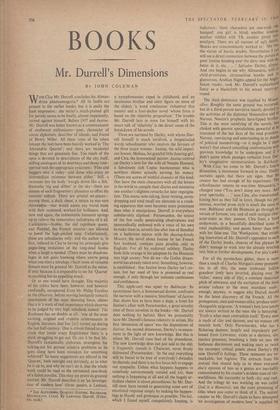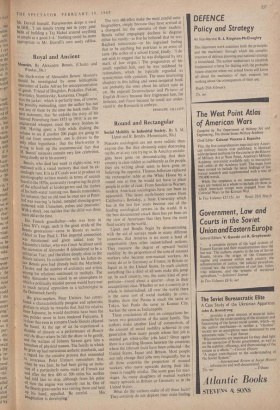BOOKS
Mr. Durrell's Dimensions
By JOHN COLEMAN
* THE ALEXANDRIA QUARTET (JUSTINE. BALTHAZAR, Mounrrouvn, CLE.A). By Lawrence Durrell. (Faber, 16s. each.) Win{ Clea Mr. Durrell concludes his Alexan- drian phantasmagoria.* All its faults are present in the earlier books, but it is easily the least impressive : the' writer's much-praised gift for parody seems to be finally, almost impatiently, turned against himself. Before 1957 and Justine, Mr. Durrell was better known as a communicator of exuberant enthusiasms—poet, chronicler of comic diplomats, describer of islands, and friend of Henry Miller. All these veins of his talent (except the last) have been heavily worked in 'The Alexandria Quartet'; and there are incidental things that are genuinely fine. Too much of the opus is devoted to descriptions of the city itself, stifling catalogues of its doorways and decay inter- spersed with the appropriate cynicisms : 'Flies and beggars own it today—and those who enjoy an intermediate existence between either.' Still, a swimmer lets his body 'wangle down like a fish,' fireworks 'rip and slither' in the sky—there are dozens of such fragmentary pleasures to offset the touristic tedium. There are several set-pieces- among them, a duck shoot, a return to war-torn Alexandria—that would adorn any travel book with their sustained, worked-for brilliance. And, now and again, the indomitable humorist springs up to relieve the remorseless melodrama of it all. Caricatures—Scobie, the old reprobate queen, and Pombal, the French amorist—are allowed to lower the high-pitched tone. Unfortunately, these are subsidiaries only; and the author is, in fact, reduced in Clea to having his principals give pages-long imitations of the long-dead Scobie when a laugh is needed. (There must be disadvan- tages in not quite knowing where you're going when you start a tetralogy.) Such items of valuable flotsam must be granted Mr. Durrell at the outset, if only because it is impossible to see his 'Quartet' as anything but an appalling wreck.
Or so one would have thought. The majority of his critics have been, however, and however confusedly, enraptured. Even Mr. Philip Toynbee in the Observer, before moving hesitantly towards conclusions of the most damning force, allows that it is 'a work of real importance which deserves to be judged by very high standards indeed.' The Bookman has no doubts at all : 'one of the most exciting, original and creative achievements in English literature that has [sic] turned up during the last half-century.' One is almost forced to con- clude that inside every Englishman there is a sheik struggling to get out. Or can it be that Mr. Durrell's fantastically elaborate strategems for talking-out, his private creative problems as he goes along have been mistaken for something achieved? So many suggestions are offered in the 'Quartet,' both outright and deviously, as to what he is up to, and why he can't do it, that the whole
work could be read as the tormented case-book of a failed novelist. This may yet prove its greatest Interest. Mr. Durrell describes it an 'an investiga- tion of modern love' (three queers, a Lesbian, a nymphomaniac raped in childhood, and an incestuous brother and sister figure on some of the slides), 'a word continuum' (whatever that means) and a four-decker novel 'whose form is based on the relativity proposition.' The trouble Mr. Durrell lays in store for himself with his smart talk of 'relativity' is the direct cause of the breakdown of his novels.
Three are narrated by Darley, with whom Dur- rell himself is much involved, a bespectacled wordy schoolmaster who receives the favours of the three major women : Justine, the wild imperi- ous Jewess; Melissa, his grateful little dancing-girl; and Clea, the homosexual painter. Justine centred on Darley's love for the wife of Nessim Hosnani, a fabulously rich Coptic businessman who is nowhere shown actually earning his money. (There are scores of wishful donnees of this kind, that leave the main characters with all the leisure in the world to compile their diaries and memorise one another's slightest remarks for later regurgita- tion. This manic note-taking, letter-writing, eaves- dropping and total recall are elements in a creak- ing apparatus that soon becomes more prominent than what it manipulates. Durrell is everywhere unbelievably slipshod : Pursewarden, the source of the few really penetrating observations and spasmodically endowed with a voice of his own to make them in, scrawls line after line of Stendhal on a bathroom mirror with his shaving-brush; Moeurs, the novel about Justine by her French first husband, contains puns possible only in English). For all his endorsed subtlety, Darley finds little strange in his adoption by the Hosnanis into high society. Nor do we—the Gothic dream- world has already taken over. Something, however, is established: that Justine loves Darley isn't cer- tain, but her need of him is presented as real enough, if only through her intimate confessions and confidences.
This apple-cart was upset by Balthazar. Its eponymous hero, a homosexual doctor, confronts the narrator with a massive 'Interlinear' of Justine that shows him to have been a dupe, a front for Justine's affair with Pursewarden, a great novelist (one of three novelists in the books—Mr. Durrell does nothing by halves). Here we presumably have Mr. Durrell's famous relativity in action. His first 'dimension of space' was the dispositions of Justine; his second dimension, Darley's re-assess- ment in the light of new knowledge. But this is where Mr. Durrell runs foul of his procedures. The new knowledge does not just add to the old; it frequently cancels it. Character, never firmly delineated (Pursewarden : 'In the end everything will be found to be true of everybody') dwindles to charade, and there is no live focus left to engage our sympathy. Unless what happens happens to somebody autonomously created and felt, then nothing is happening at all and all the hugely ar- ticulate chatter is about pincushions. So Mr. Dur- rell must have turned to generating some sort of emotional response simply by making his happen- ings as bloody and grotesque as possible. The list, which I found myself compulsively keeping, is ludicrous: three characters are one:,eyed, one humped; one girl is blind, another noselessy another riddled with TB, another pitted with smallpox. There are all manner of ugly deaths. Shocks are conscientiously worked in : 'She was the victim of heroic doubts. Nevertheless I earl, still see a direct connection between the picture 01 poor Justine bending over the dirty sink with the foetus in it, etc. . . .' Salvador Darley, And one begins to see why Alexandria, with its child-prostitutes, circumcision booths and it' glamorous, Arabian Nights appeal for the Angl°' Saxon reader, took Mr. Durrell's sophisticated fancy as a blackcloth to his sexual merry-go' round.
The third dimension was supplied by Mount" olive. Roughly the same ground was traversed, but in a third-person narrative mainly devoted to the activities of the diplomat Mountolive and of Narouz, Nessim's prophetic hare-lipped brother. This is the most satisfying of the novels, less choked with gnomic speculations, powerful in. Its treatment of the last days of the mad primittve, Narouz, convincing and entertaining in its details of political manoeuvring—or it might be if there weren't that absurd cancelling confrontation with previous knowledge to be undergone and If it didn't quote whole passages verbatim from Dar- ley's imaginative reconstructions in Balthazar. With Clea, we come to Mr. Durrell's fourth dimension, a movement forward in time. Darley narrates again, but there are signs that his creator has had enough of his experiment. The schoolmaster returns to war-time Alexandria, 3 changed man (`You don't stoop any more. And your spectacles . . .' says Clea, also transformed, kissing him as they fall in love), though his por- tentous, worried prose style is much the same at ever. Balthazar and the Hosnanis go through re- versals of fortune, too, and of such vestigial char- acter-traits as they possess. Clea loses a hand underwater, in a beautifully described scene of total implausibility, and paints better than ever with her false one. The 'Workpoints,' that irritat- ing innovation of Mr. Durrell's appended to each of the Darley books, sheaves of fine phrases he didn't manage to work into the already bristling text, hint at further developments. For pity's sake.
For all the pyrotechnic glitter, there is more than a touch of Charles Morgan's stony pomnosi- ties in all this, the same irrelevant hollow grandeur (only here inverted, playing over the 'richer,' seamy side of life), a constant rhetorical pitch of utterance, and the ascription of the most arcane culture to the most mundane souls: enough, anyway, to suggest why Durrell should be the latest discovery of the French. All the protagonists, men'and women alike, produce inter- changeable epigrams. 'A woman's best love letters are always written to the man she is betraying.' `Truth is what most contradicts itself.' Every man is made of clay and daimon, and no woman can nourish both.' Only Pursewarden, who has a flickering daimon, largely and impudently pur- loined from Lawrence, exists as a derisive, dis- tinctive presence, breathing a little air into the hothouse discussions and making once or twice the necessary critical points about Darley's (by now Durrell's) failings. These moments are re- markable, but fugitive. The extracts from his journal that should help us to share everyone else'e opinion of him as a genius are inevitably contaminated by his creator's strident man-of-the- worldliness. He succumbs to both chic and rant. And the trilogy he was working on was called God is a Humorist, not the most promising of titles when you come to think of it. The neatest counter to Mr. Durrell's claim to have attempted 'an investigation of modern love' is supplied by
Mr. Durrell himself. Pursewarden drops a card to DHL. 'I am simply trying not to copy your habit of building a Taj Mahal around anything as simple as a good f--k.' Nothing could be more appropriate to Mr. Durrell's own seedy edifice.







































 Previous page
Previous page